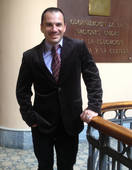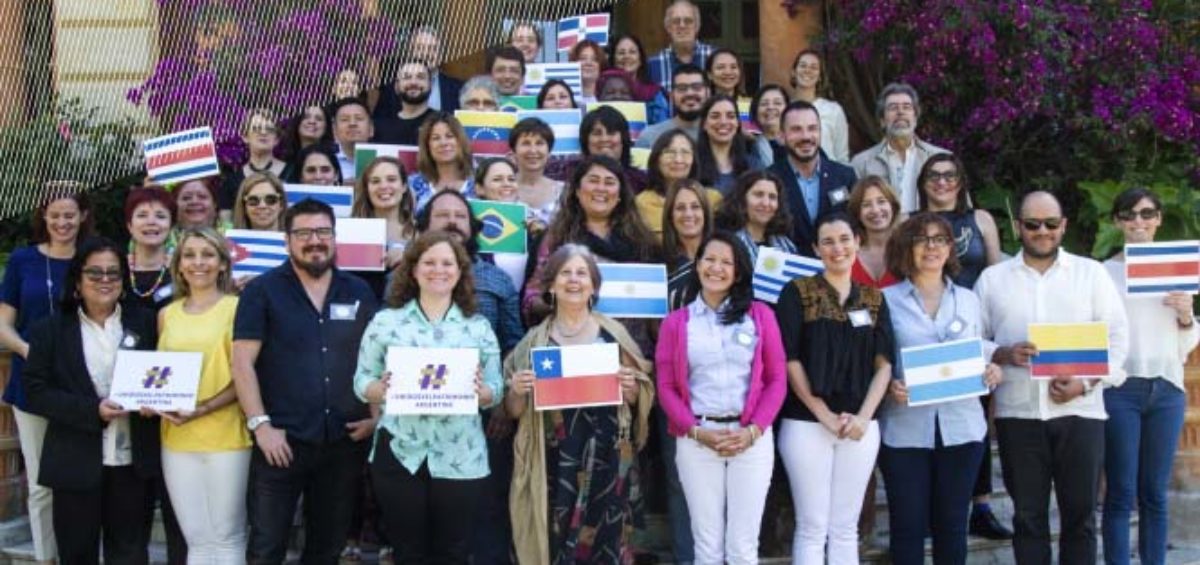By Frédéric Vacheron
Director of Villa Ocampo UNESCO Observatory
/NETWORK
Latin America and the Caribbean Academic Cooperation Network on ICH (ReCA PCI LAC)
On November 21st and 22nd 2017, in Buenos Aires, Argentina, the Regional Meeting for Searching for Cooperation Mechanisms on Intangible Cultural Heritage and Higher Education took place with the objective of identifying, agreeing and designing a cooperation mechanism at a tertiary education level around Intangible Cultural Heritage (ICH), in Latin America and the Caribbean region.
This meeting was attended by 43 participants representing 30 universities and higher education institutes from 12 countries in the region. As a result of this space of reflection and sharing, the Latin America and the Caribbean Academic Cooperation Network on ICH (ReCA PCI LAC) emerged.
The State of the Art of Intangible Cultural Heritage
The 2003 Convention for the Safeguarding of the Intangible Cultural Heritage (hereafter the Convention) came into force in 2006 and, so far, it has been ratified by 177 States Parties (05/10/2018). The rapid ratification is a testimony of the countries’ concern to safeguard the world’s living heritage, especially at a time of rapid social transformation, where Intangible Cultural Heritage (hereafter ICH) faces serious risks and threats that can lead to the disappearance of these expressions.
However, following an evaluation carried out by the UNESCO Internal Oversight Service in 2013, it was identified that many of the State parties were facing difficulties for the implementation of the Convention due to the lack of trained human resources. In particular, the understanding of the its concepts continues representing a problem, which is above all demonstrated when carrying out inventories, formulating safeguard measures and applying them, cooperating with other countries, accessing the funds of the Convention, preparing application files and, specially, consulting and involving communities in order to guarantee their effective participation in the safeguarding processes.
UNESCO recognizes the important role that higher education institutions play in the training of future planners and administrators when working in the field of the safeguarding of ICH. It also notes that, currently, the teaching of ICH is very dispersed in different disciplines (studies of heritage, anthropology, environment, etc.). Likewise, most studies on heritage tend to focus on tangible heritage, while ICH is not yet a common theme in cultural studies and cultural management programs.
On the other hand, in recent times, in some countries, there has been a growing training offer related to cultural management in the academic field. For this reason, in preparatory meetings related to the creation of cooperation mechanisms on ICH and higher education, this approach to cultural management has been agreed to be adopted.
In view of the above, it would be appropriate for universities and other higher education institutions, which integrate the safeguarding of ICH in the curricula of their cultural management programs, to be interconnected and to work in close collaboration with UNESCO, in order to facilitate the process of training, as well as broadening the understanding of the notion of ICH to different audiences, using the respective institutional instruments (in particular networks, chairs and research centers).
In this sense, regional initiatives of this type are taking place at a global level. In Europe and Asia, a cooperation mechanism between higher education institutions is currently in the process of being constituted in order to create global synergies and provide common concepts and references in the field of ICH.
Intangible Cultural Heritage in Latin America and the Caribbean
Latin America and the Caribbean region is made up of 41 extremely diverse countries, 31 of which are, so far, part of the Convention. Middle-income countries, such as Mexico or Chile; other less developed countries, such as Haiti and small island states, and others with large territories, such as Brazil and Argentina, are part of the region.
Likewise, the levels of application to the Convention vary greatly from one country to another, and within the same countries, depending on the levels of governance and decision-making, as well as on the academic offer of cultural management courses which include ICH in their curricula. In this framework, a preliminary study was carried out on the level of training on ICH at higher education level in the region.
In this context, stimulating the establishment of a space for academic cooperation in higher education around ICH could lead to greater knowledge of the Convention, facilitating the exchange of information on its application and generating reflection spaces on its implementation; thus contributing to the reduction of asymmetries and the generation of knowledge.
For the aforementioned reasons, UNESCO is establishing strategic alliances with relevant institutions, including universities and other higher education centers, in an attempt to promote the safeguarding of ICH among future actors in the field of cultural management.
The Meeting
The UNESCO Office in Montevideo organized this meeting in Buenos Aires, Argentina, in cooperation with IESALC (International Institute for Higher Education in Latin America), FLACSO (Latin American Faculty of Social Sciences), CRESPIAL (Regional Centre for the Safeguarding of Latin American Intangible Cultural Heritage) and the UNESCO Office in Havana, Regional Office for Culture for Latin America and the Caribbean.
Participants were academics, managers, decision-makers and representatives of higher education institutions in the Latin American region, who are involved in cultural management programs, especially those integrating ICH in their academic programs. These participants are seen by UNESCO as the responsible for developing the capacities of future actors in the cultural field, both in the private sector and in government entities.
After three rounds of thematic tables at the headquarters of FLACSO, which served to reflect on the 2003 Convention, its relationship with cultural management, and cooperation in the fields of higher education and cultural management, a closed session was organized where participants exchanged knowledge, needs and issues related to the teaching of ICH, as well as analyzed possible cooperation mechanisms.
The event took place at the UNESCO Observatory Villa Ocampo, and was devoted to agreeing and collaboratively designing the cooperation mechanism. With the contributions of all participants, the objectives, the working mechanisms, the roles, responsibilities, etc. were discussed and agreed upon. Commitments were assumed on a personal or institutional basis, which were recorded in a Final Joint Declaration.
This declaration and joint work was transformed into the Creation Act of the cooperation mechanism: the Latin America and the Caribbean Academic Cooperation Network on ICH (ReCA PCI LAC).
Results of the Meeting
- Creation of a mechanism for cooperation on ICH and higher education. The cooperation mechanism that the participants decided to take on was that of a network (Red), giving rise to the Latin America and the Caribbean Academic Cooperation Network on ICH (ReCA PCI LAC).
- Definition of the objectives of such mechanism. Among the specific objectives identified by the signatory members of the Creation Act, the following stand out:
- Promote the dissemination of different safeguarding experiences of ICH in cultural management programs.
- Offer knowledge about ICH inspired and based on the Convention, operational guidelines and the principles and procedures for the implementation of the Convention – in relation to the characteristics, particularities, needs and difficulties inherent to the realities of the region – for guaranteeing the improvement of knowledge management.
- Publicize good practices in the area of ICH and promote the exchange of knowledge and experiences of application of the Convention, through the creation of a platform.
- Promote collaborations with other UNESCO higher education networks that deepen issues related to ICH (for example, indigenous universities, traditional and local knowledge, intercultural dialogue, cultural tourism, etc.).
- Guarantee the dissemination of information about cultural management programs that integrate ICH in their academic curricula, through the design and publication of a brochure.
- Encourage the creation of a list of academic experts familiar with the Convention and the ICH of their respective countries to promote South-South and North-South cooperation.
- Consensual design of the organization and working mechanism; establishment of the basis to design a knowledge management system among participants, and elaboration of mechanisms for communication and relationship development with third parties. Currently, the ReCA PCI LAC is in the second phase of its founding stage. After the signing of the Creation Act, members have distributed themselves in different committees to organize the work and assign the commitments acquired.
- Establishment of a consistent database, with the contribution of institutions that have programs related to the teaching of ICH. In collaboration with CRESPIAL, the Communications Management Commission will be responsible for setting up a platform with this objective.
- Establishment of necessary and possible, personal and institutional commitments, as included in the network’s Creation Act, as well as of activities proposals for 2018.
Members of the network are working on the organization of a new event on “The role of the Academy for the management of the safeguarding of musical expressions inscribed in the Representative List of the 2003 Convention: example of the Fado, Portugal, and Tango, Argentina. The colloquium would take place in October 2018 at the UNESCO Observatory Villa Ocampo, Buenos Aires.
The activities of the network have the objective of promoting interaction on the topic of management of ICH among representatives of the Academy.

Frédéric Vacheron is a Specialist of the UNESCO Culture Programme for the Cono Sur. He is also de Director of the Villa Ocampo Programme.
_______________________________________________________
Header image: Observatorio de UNESCO Villa Ocampo (Buenos Aires).





